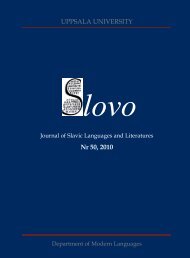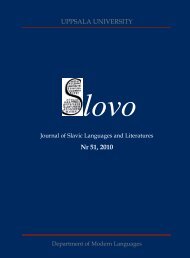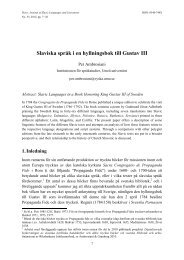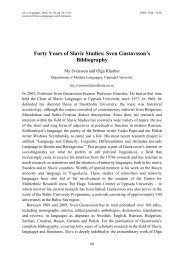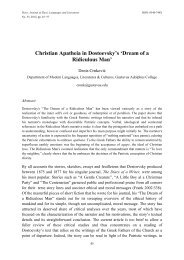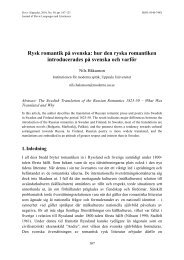Full text PDF - Index of - Uppsala universitet
Full text PDF - Index of - Uppsala universitet
Full text PDF - Index of - Uppsala universitet
Create successful ePaper yourself
Turn your PDF publications into a flip-book with our unique Google optimized e-Paper software.
Atle Grønn<br />
‘Byvalo’ and ‘used to’ as verbal quantifiers<br />
These verbs are quantifiers over times, i.e. they control (shift) the reference time <strong>of</strong><br />
their complement. For instance, “budet”, “will” or “would” change the reference time<br />
<strong>of</strong> the embedded verb to a future time, while “has” and “had” shift the reference time<br />
to a past time. Attitude verbs like “says”, “said”, “govorit”, “govoril” are more<br />
complicated. The important point here is that the semantics <strong>of</strong> these verbs involves<br />
quantification over the reference time <strong>of</strong> the complement, that is, metaphorically<br />
speaking, the “subjective now” <strong>of</strong> the attitude holder.<br />
What about habitual quantifiers such as “used to”, “byvaet/byvalo”? Apparently,<br />
these verbal quantifiers change the reference time <strong>of</strong> the embedded verb to times<br />
which occur repeatedly (in accordance with certain con<strong>text</strong>ual restrictions) within a<br />
habitus.<br />
In this paper I propose to relate “new” data involving habitual verbal quantifiers and<br />
similar constructions to the sequence <strong>of</strong> tense parameter (adapted from Grønn & von<br />
Stechow 2010, 2011):<br />
A language L is an SOT language if and only if:<br />
(i) verbal quantifiers <strong>of</strong> L transmit temporal features;<br />
(ii) semantically tenseless propositions (or verb phrases (VP)) do not license<br />
present tense morphology.<br />
First, consider the traditional environment in which Russian makes use <strong>of</strong> the present<br />
tense in the complement under a past tense in the matrix:<br />
(4) Он сказал[up], что живет[un] под Москвой. (Viktor Pelevin, “Pokolenie P”)<br />
(5) He said[up] he was[up] living just outside Moscow.<br />
Using the metaphor <strong>of</strong> the attitude holder’s subjective now, we can say that the<br />
reported “living just outside Moscow” is simultaneous with the attitude (speech) report<br />
itself from the perspective <strong>of</strong> the subject <strong>of</strong> the sentence (the attitude holder “on – he”).<br />
The different feature checking mechanisms in English and Russian are depicted in<br />
Figure 1.<br />
a. PAST He said he was living outside Moscow (English)<br />
ip up up<br />
|________|_______|<br />
(non-local agreement)<br />
b. PAST On skazal, čto “subjective NOW” živet pod Moskvoj (Russian)<br />
ip up in un<br />
|__________| |__________| (local agreement)<br />
Figure 1. Feature transmission in complement tense.<br />
65



